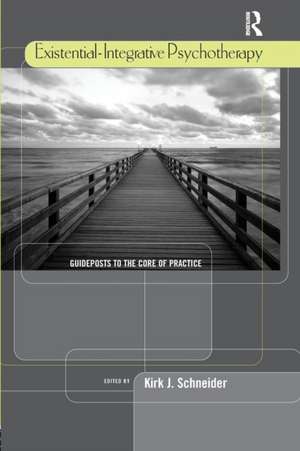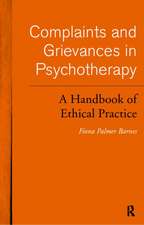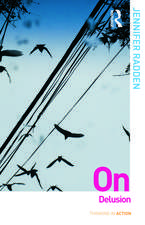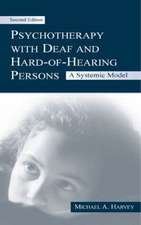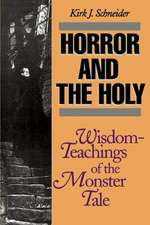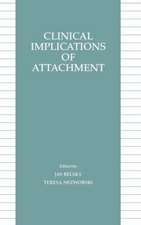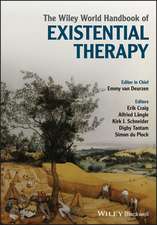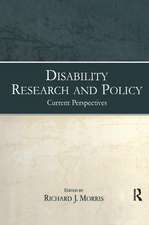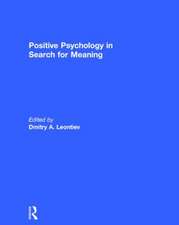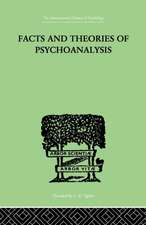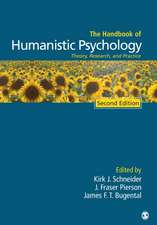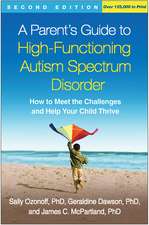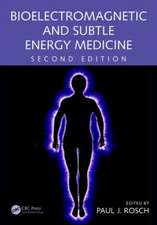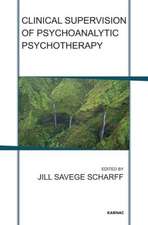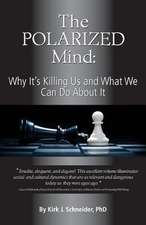Existential-Integrative Psychotherapy: Guideposts to the Core of Practice
Editat de Kirk J. Schneideren Limba Engleză Paperback – 24 noi 2015
| Toate formatele și edițiile | Preț | Express |
|---|---|---|
| Paperback (1) | 356.74 lei 6-8 săpt. | |
| Taylor & Francis – 24 noi 2015 | 356.74 lei 6-8 săpt. | |
| Hardback (1) | 914.51 lei 6-8 săpt. | |
| Taylor & Francis – 23 iul 2007 | 914.51 lei 6-8 săpt. |
Preț: 356.74 lei
Preț vechi: 375.51 lei
-5% Nou
Puncte Express: 535
Preț estimativ în valută:
68.26€ • 71.47$ • 56.62£
68.26€ • 71.47$ • 56.62£
Carte tipărită la comandă
Livrare economică 09-23 aprilie
Preluare comenzi: 021 569.72.76
Specificații
ISBN-13: 9781138969261
ISBN-10: 1138969265
Pagini: 368
Dimensiuni: 152 x 229 x 20 mm
Greutate: 0.44 kg
Ediția:1
Editura: Taylor & Francis
Colecția Routledge
Locul publicării:Oxford, United Kingdom
ISBN-10: 1138969265
Pagini: 368
Dimensiuni: 152 x 229 x 20 mm
Greutate: 0.44 kg
Ediția:1
Editura: Taylor & Francis
Colecția Routledge
Locul publicării:Oxford, United Kingdom
Public țintă
Academic, Postgraduate, and Undergraduate AdvancedCuprins
Preface. Introduction: Existential-Integrative Psychotherapy: A New Era. Part I: From Segregation to Integration. Bassett-Short and Hammel, Existential Psychotherapy from Within the Training Process. Part II: Guideposts to an Existential-Integrative (EI) Approach. How the Chapter is Organized. Theory of the Existential-Integrative (EI) Approach. Therapy as Liberation Strategies/Consciousness as Liberation Levels. Constriction (Smallness) and Expansion (Greatness) as Omnipresent Horizons. Developmental View. Therapeutic Implications of the Theory. How to Discern Appropriate Liberation Strategies. The Offering of Nonexperiential Liberation. The Offering of Semi-Experiential Liberation. The Offering of Experiential Liberation. Presence: A Primary Nutrient. Smallness-Greatness "Clustering:" Keys to the Experiential Work. Invoking the Actual: Creatively Inspiring Presence. Vivifying and Confronting Resistance (Protections). Rediscovering Meaning and Awe. Summary of the EI Model. Appendices. Summary of the Four Stances of the Experiential Liberation Strategy. Ways the Stances Utilize Constrictive-Expansive Dynamics. Summary of EI Decision Points. Skill-Building Exercises: Suggestions for Instructors. I. Personal Exercises. II. Clinical Exercises. Notes. References. Part III: Case Studies of the EI Model. Section 1: EI Approaches to Multiculturalism. Comas-Diaz, Latino Psychospirituality. Rice, An African-American Perspective: The Case of Darrin. Alsup, Existentialism of Personalism: Case of a Native American Adolescent. Section 2: EI Perspectives on Gender, Power, and Sexuality. Brown, Feminist Therapy As A Meaning-Making Practice: Where There Is No Power, Where Is The Meaning? Monheit, A Lesbian and Gay Perspective: The Case of Marcia. Serlin, Women and the Midlife Crises: The Anne Sexton Complex. Section 3: Innovations in Short-Term EI Practices. Bugental, Preliminary Sketches for a Short-Term Existential-Humanistic Therapy. Galvin, Brief Encounters with Chinese Clients: The Case of Peter. Section 4: EI Mediation of Addiction: Alcoholism. Ballinger, Matano, and Amantea, A Perspective on Alcoholism: The Case of Mr P. Section 5: Spiritual and Religious Issues From an EI Perspective. Hoffman, An Existential-Integrative Approach to Spiritual and Religious Clients. Section 6: Cognitive-Behavioral Innovations of EI Practice. Wolfe, Existential Issues in Anxiety Disorders and Their Treatment. Buntin and Hayes, Language and Meaning: Acceptance and Commitment Therapy and the EI Model. Section 7: EI Approaches to Severe States. Dorman, Dante’s Cure: Schizophrenia and the Two-Person Journey. Mendelowitz, Meditations on Dissociation: Kristina and the Enigmatic Self. Section 8: EI Emphases on the Intersubjective. Portnoy, Relatedness: Where Existential and Psychoanalytic Approaches Converge. Stolorow, Autobiographical and Theoretical Reflections on the "Ontological Unconscious". Fosha, Transformance, Recognition of Self by Self, and Effective Action. Section 9: EI Child Therapy. Curtin, The Inner Sense of the Child: The Case of Joey. Section 10: EI Encounters with Death and Dying. Bugental, Swimming Together In a Sea Of Loss: A Group Process for Elders. Greening, Reflections on the Depressed and Dying: The Case of Carol. Summary and Conclusion.
Recenzii
"...This is a rich harvest, and there is a high standard throughout, as if the editor had been quite demanding of his contributors. This book is strongly recommended to anyone who wants to know how existential-integrative therapy has been developing over the past few years. It is also recommended to anyone who wants to see what a wide range of outcomes are possible in therapy- not just restricted to the one person in the room, but extending out into the family and community. It is really lovely to come across an open-hearted book like this...there is nothing dry about this book, and I found it quite inspiring." - John Rowan, Ph.D. in Association for Humanistic Psychology Perspective
"Existential-Integrative Psychotherapy is very well written, informative, and in my opinion, a masterpiece. It is useful for therapists, counselors, ministers, and end-of-life practitioners, not only for information it contains but also for joining these issues into larger platforms." - Daryl Paulson, Ph.D., Association for Humanistic Psychology Perspective (Feb/March, 2008, p. 30)
"Existential-Integrative Psychotherapy: Guideposts to the Core of Practice is a needed update on existential approaches. It could be argued that an understanding of the principles of existential therapy is needed by all therapists, as it adds a perspective that might, as Schneider contends, form the basis of all effective treatments. The search for meaning is a human characteristic-and EI approaches take the search head on." - Bruce E. Wampold in PsycCritiques (February 6, 2008, Vol. 53, Release 6, Article 1)
"[M]any would benefit from this book: those currently practicing a particular approach and looking for ways to deepen and expand their practice; students, trainees, and interns who are exploring their clinical identity; instructors who are looking for a course text; those currently practicing existential psychotherapy and interested in its evolution; and anyone charting the course of the development in the field."
-Tamara T. Thebert, MFT Intern, CHT, in The Therapist (May/June 2008)
"This book is very well written, informative and, in my opinion, a masterpiece. It is useful for therapists, counselors, ministers, and end-of-life practioners, not only for the information it contains, but also for joining these issues into larger platforms."
-Daryl Paulson, Ph.D., in ahp Perspective (February/March 2008)
"The large quantity of case vignettes in every chapter...bring these contributions to life in a quite sparkling way. This is a rich harvest and there is a high standard throughout. This book is strongly recommended to anyone who wants to know how existential-integrative therapy has been developing over the past few years. It is really lovely to come across an open-hearted book like this. There is nothing dry about this book, and I found it quite inspiring." -John Rowan in Existential Analysis, March 2010
"Existential-Integrative Psychotherapy is very well written, informative, and in my opinion, a masterpiece. It is useful for therapists, counselors, ministers, and end-of-life practitioners, not only for information it contains but also for joining these issues into larger platforms." - Daryl Paulson, Ph.D., Association for Humanistic Psychology Perspective (Feb/March, 2008, p. 30)
"Existential-Integrative Psychotherapy: Guideposts to the Core of Practice is a needed update on existential approaches. It could be argued that an understanding of the principles of existential therapy is needed by all therapists, as it adds a perspective that might, as Schneider contends, form the basis of all effective treatments. The search for meaning is a human characteristic-and EI approaches take the search head on." - Bruce E. Wampold in PsycCritiques (February 6, 2008, Vol. 53, Release 6, Article 1)
"[M]any would benefit from this book: those currently practicing a particular approach and looking for ways to deepen and expand their practice; students, trainees, and interns who are exploring their clinical identity; instructors who are looking for a course text; those currently practicing existential psychotherapy and interested in its evolution; and anyone charting the course of the development in the field."
-Tamara T. Thebert, MFT Intern, CHT, in The Therapist (May/June 2008)
"This book is very well written, informative and, in my opinion, a masterpiece. It is useful for therapists, counselors, ministers, and end-of-life practioners, not only for the information it contains, but also for joining these issues into larger platforms."
-Daryl Paulson, Ph.D., in ahp Perspective (February/March 2008)
"The large quantity of case vignettes in every chapter...bring these contributions to life in a quite sparkling way. This is a rich harvest and there is a high standard throughout. This book is strongly recommended to anyone who wants to know how existential-integrative therapy has been developing over the past few years. It is really lovely to come across an open-hearted book like this. There is nothing dry about this book, and I found it quite inspiring." -John Rowan in Existential Analysis, March 2010
